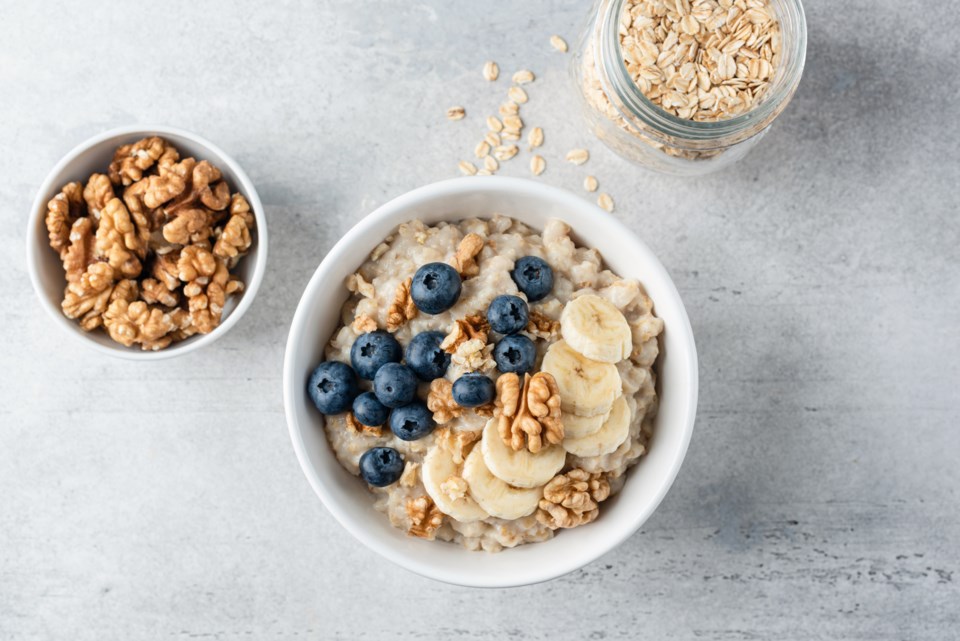Last week I talked about healthy grains and today I will focus on the benefits of whole oats in a bit more detail. Even though I am not a big eater of bread or flour products, I am a huge fan of oatmeal combined with other super healthy foods and whole grains (see last week’s article or email me for a list). I try to have a healthy grain once a day either in a breakfast bowl or in a salad.
When I talk about oatmeal being an excellent breakfast bowl, I am referring to the whole flake or even whole grain or steel cut oats. They require more cooking than instant oatmeal (which is void of the healthy parts of the oat).
Oats are very easy to cook and if you combine with other healthy ingredients, you multiply the health benefits. To your cooked oatmeal, add a tablespoonful each of hemp hearts, chia seeds, walnuts, pumpkin seeds and/or raw sunflower seeds as well as a teaspoon of ground flax. This is an excellent way to boost your consumption of protein, omega 3s (healthy fats) and fibre. These fats are also very beneficial for weight loss.
To get an extra vitamin (and flavour) boost, add homemade apple or crab apple sauce or canned peaches or nectarines or homemade juice (low sugar), cut up apples, bananas, prunes, dates or any other fruit or berry. Get creative and find your favourite blend. Avoid adding sugar but if you must have it sweeter, use honey or maple syrup.
I always pre-cook other grains (the night before) to add to my oatmeal. My favourite lately is faro but try also any of the grains mentioned last week: barley, quinoa, amaranth, buckwheat, teff, bulgur, freekeh, millet or wild rice…
Oats contain many healthy vitamins and minerals including but not limited to potassium, iron, the B vitamin thiamin, phosphorus and magnesium.
Oats have so many health benefits ranging from improved gut health and weight management to decreased risk of heart disease and diabetes, as well as lowering cholesterol levels in the body. Other benefits of oatmeal include increased metabolism and athletic performance (if eaten within an hour of exercising). Because of the soluble fibre beta-glucan, oats can improve lipid levels in the blood and postprandial effects on blood sugars. It is also very easy to digest, and is a prebiotic food, making it beneficial for those with gut health issues. Oats improve the immune system also.
Many people, including myself, remember being forced to eat porridge as a kid because it was cheap, fast and easy. It took me half my adult life to get back into eating oatmeal and I still don’t like porridge with milk and sugar. However, the way that I eat it now has no resemblance to what I was fed growing up. It is much more interesting, tasty and nutritious because of the added ingredients.
Another way I have been using organic oats is in homemade granola or granola bars. There are many recipes online and making your own is much more economical and healthier than buying pre-made from the store.
I must reiterate that when I am talking about oatmeal, I am not talking about the instant oatmeal packages that are quick cook by adding hot water. They are full of sugar, salt, white fibre, and may contain colouring and artificial flavouring, and not a healthy food at all. Real oats are the whole oats that require several minutes of cooking time depending on how soft you want them. Steel cut oats are even better but require more cooking time.
I hope others will join me in exploring the amazing benefits of organic oats and share your own recipes.
Claire Nielsen is a health coach, author, public speaker and founder of www.elixirforlife.ca. The information provided in the above article is for educational purposes only and is not a substitute for professional health and medical advice. Please consult a doctor, health-care provider or mental health practitioner if you're seeking medical advice, diagnoses and/or treatment.



